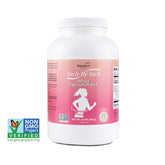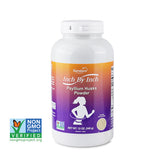How to Maximize the Benefits of Vitamin C: Effective Ways to Take It

Vitamin C (ascorbic acid) is a water-soluble vitamin essential to the human body, playing a vital role in numerous physiological functions. From boosting immunity to acting as a powerful antioxidant and supporting collagen production, vitamin C is a key nutrient for maintaining overall health. In this article, we’ll explore the major benefits of vitamin C and the most effective ways to incorporate it into your daily routine.
Top 5 Health Benefits of Vitamin C
● Strengthening the Immune System:
Vitamin C plays a crucial role in supporting immune function. It enhances the activity of white blood cells and increases the body’s resistance to infections, particularly helping to prevent respiratory illnesses like the common cold.
● Powerful Antioxidant:
As a strong antioxidant, vitamin C helps protect cells from damage caused by free radicals. This contributes to reducing the risk of age-related diseases such as cardiovascular disease and certain types of cancer.
● Collagen Production:
Vitamin C is essential for the synthesis of collagen, a major structural protein found in skin and connective tissues. It helps maintain skin elasticity, supports wound healing, and plays a role in preventing premature aging.
● Enhancing Iron Absorption:
Vitamin C improves the absorption of non-heme iron (plant-based iron), making it especially beneficial for those who follow a plant-based diet. Consuming vitamin C-rich foods with iron-rich plant foods can significantly increase iron absorption.
● Supporting Mental Health:
Recent studies suggest that vitamin C may help reduce stress and alleviate symptoms of depression, indicating a positive impact on overall mental well-being.
Effective Ways to Take Vitamin C
Vitamin C is naturally abundant in a wide variety of fruits and vegetables, including:
- Citrus fruits such as oranges and grapefruits
- Kiwis
- Strawberries
- Bell peppers
- Broccoli
- Spinach
To retain the maximum amount of vitamin C, it’s best to eat these foods raw or cook them using gentle methods like steaming or sautéing, as vitamin C is sensitive to heat.
If it’s difficult to get enough vitamin C through diet alone, supplements are a practical option. Vitamin C supplements come in various forms—tablets, capsules, and powders—and can be chosen based on personal preference and needs.
For adults, a daily intake of 500 to 1,000 mg of vitamin C is generally recommended. Since it’s a water-soluble vitamin, any excess is excreted in the urine. However, consuming more than 2,000 mg per day can cause gastrointestinal discomfort, so it’s important to stick to an appropriate dosage.
Vitamin C is a vital nutrient that contributes to immune defense, antioxidant protection, collagen synthesis, and more. By including a variety of vitamin C-rich foods in your diet and using supplements when necessary, you can ensure you’re getting enough of this essential vitamin. Understanding and practicing effective ways to consume vitamin C is an important step toward a healthier lifestyle.
Source: 하이닥(https://news.hidoc.co.kr/)
Dailycore-Vitamin C
50 Sticks
$29.99

![Inch By Inch (Psyllium Husks Powder) [Buy 4 Get 1 FREE] - Health Korea Shop](http://healthkoreashop.com/cdn/shop/files/health-korea-shop-default-title-inch-by-inch-psyllium-husks-powder-buy-4-get-1-free-26476880429165_165x.gif?v=1757024963)
![Inch By Inch (Psyllium Husks Powder) [Buy 4 Get 1 FREE] - Health Korea Shop](http://healthkoreashop.com/cdn/shop/files/health-korea-shop-default-title-inch-by-inch-psyllium-husks-powder-buy-4-get-1-free-26471389102189_165x.jpg?v=1757024971)
![Inch By Inch (Whole Psyllium Husks) [Buy 3 Get 1 FREE] - Health Korea Shop](http://healthkoreashop.com/cdn/shop/files/health-korea-shop-default-title-inch-by-inch-whole-psyllium-husks-buy-3-get-1-free-26471348764781_165x.jpg?v=1757024989)

![Inch By Inch (Organic Psyllium Husks Powder) [Buy 3 Get 1 FREE] - Health Korea Shop](http://healthkoreashop.com/cdn/shop/files/health-korea-shop-default-title-inch-by-inch-organic-psyllium-husks-powder-buy-3-get-1-free-26471394771053_165x.jpg?v=1757024965)
![Inch By Inch (Organic Psyllium Husks Powder) [Buy 3 Get 1 FREE] - Health Korea Shop](http://healthkoreashop.com/cdn/shop/files/health-korea-shop-default-title-inch-by-inch-organic-psyllium-husks-powder-buy-3-get-1-free-26471394803821_165x.png?v=1757025003)

